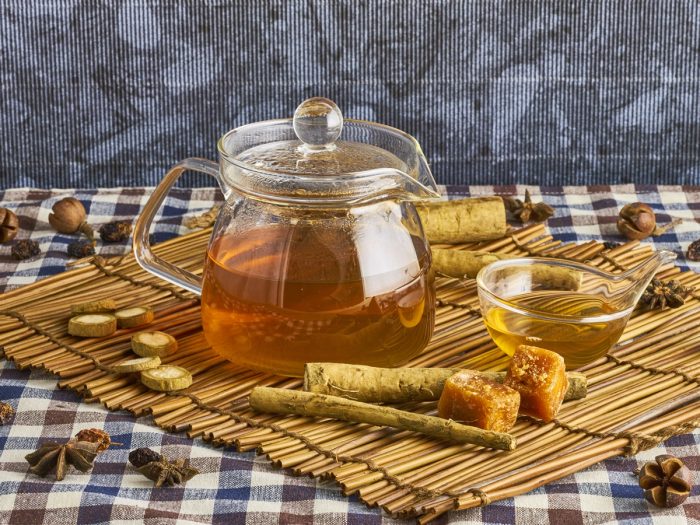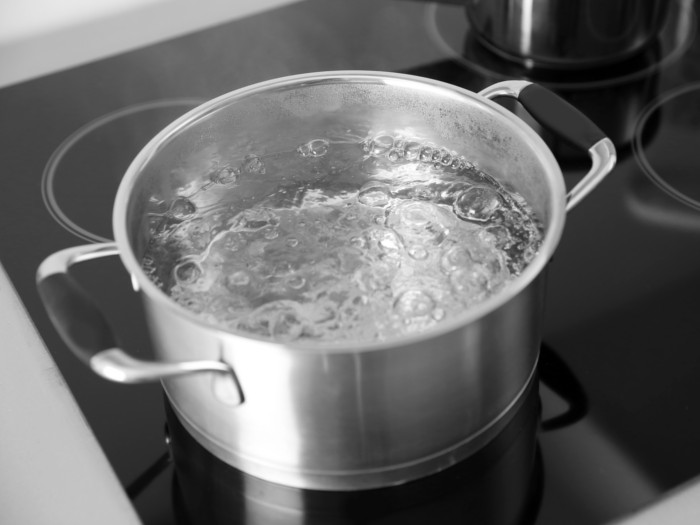Burdock root may have a long list of health benefits such as detoxifying the body, healing the liver, preventing chronic disease, reducing inflammation, boosting the immune system, healing respiratory infections, improving hair health and soothing stomach disorders. Some of the side effects of drinking this tea can include uterine contractions, as well as allergic reactions in the form of contact dermatitis. Burdock root toxicity can occur when consumed in high doses and may include dizziness, headache, dry mouth, sweating, fever, and slurred speech. Again, when this tea is taken in moderation, it is widely considered a safe and beneficial health tonic.
Benefits of Burdock Root Tea
Burdock root tea can be beneficial if you want a remedy for high blood pressure, cold and flu, liver toxicity, arthritis, gout, headaches, chronic inflammation, hair loss, dandruff, indigestion, bronchitis, constipation, acid reflux disease, fever, and edema. Some other best benefits offered by burdock tea are listed below.
Potential Diuretic Effects
In traditional use, burdock root tea was commonly turned to for its potentially diuretic and diaphoretic effects, meaning that it caused sweating and urination in people who drank it. This can help to purify the blood and detoxify the body, as sweating and urination are both ways for the body to expel excess toxins, salts, and water, thereby relieving stress on the liver, lymphatic system, and kidneys. [1]

Burdock root tea is an integral part of Chinese medicine. Photo Credit: Shutterstock
May Improve Heart Health
Possibly high potassium levels found in burdock root tea mean that this herbal beverage can be excellent for heart health, as it can reduce strain on the cardiovascular system by lowering blood pressure. Potassium not only regulates the fluid balance in the body but also acts as a vasodilator, helping to prevent atherosclerosis, heart attacks, and strokes. [2]
May Improve Immune System
Notable levels of vitamin C in this root tea may help to stimulate the immune system and the production of white blood cells, while also perhaps boosting collagen production and speeding the healing and recovery process following an illness. [3]
May Improve Liver Function
A number of studies have shown that burdock root tea can help speed the regrowth process of liver cells following serious diseases, such as cirrhosis and hepatitis. The liver is a precious organ that can be easily damaged, making this brew very important to individuals with blood-borne diseases or alcohol-induced damage. [4]
May Boost Hair Care
The phytosterols found in burdock root tea, as well as the essential oils in the root, can prevent hair loss and improve the health of the scalp and follicles, eliminating dandruff and other common issues. [5]
May Decrease Inflammation
In natural health traditions, burdock root tea was often recommended for people suffering from headaches, fever, aches, pains and joint disorders. This is due to the potentially anti-inflammatory nature of this herbal tea, and people still turn to this brew for similar conditions. For those with gout, research has shown that the compounds in burdock root tea can decrease levels of uric acid in the blood, improving this condition. [6]
May Heal Respiratory Issues
This herbal tea has both, expectorant and decongestant properties, so if you’re suffering from a cough, cold or flu-like symptoms, a cup or two each day can help cut through the phlegm and mucus, while the antibacterial nature of the tea can attack the underlying infection to speed healing. [7]
How Do You Make Burdock Tea?
Making burdock root tea is quite simple, provided you have access to fresh burdock root. You may also purchase burdock root tea that has already been shredded and roasted, and therefore ready to brew. Let’s take a look at the step-by-step procedure to make burdock tea.

Burdock Root Tea Recipe
Ingredients
- 8-10 burdock root strips
- 2 cups water filtered
- 1 tsp organic honey or sugar
Instructions
- To make burdock root tea, first, buy fresh burdock roots. Begin by cutting them into 1-2 inch chunks. Then, using a potato peeler or a knife, shred the root chunks into thin strips, which might look like bark peelings. Place this outside to dry in the sun for a few hours.
- Once they are dry, place them in a frying pan and heat them up, but do not use oil. They should roast quite easily if you heat them for 5-10 minutes and you want the color to be a rich golden brown. Once they are cooled, they can be brewed into burdock root tea. Store the excess for later use in a mason jar kept in a cool, dark and dry place.

- Place the burdock root strips in a teapot. Once done, bring the water up to a boil in a stainless steel pot.
- Remove the stainless steel pot from the stove and let it cool for 2-3 minutes. Then pour it into the teapot.
- Allow the mixture to steep for 5-10 minutes.
- Thereafter, pour the tea, add any natural sweeteners to it, and enjoy!

Notes
Burdock Root Tea Side Effects
Some of the notable side effects of burdock root tea include allergic reactions, negative interactions for pregnant and nursing women, and possible toxicities if the roots have been contaminated or are consumed in too high a concentration.
- Pregnancy – Studies have shown that burdock root tea can stimulate uterine contractions, which is dangerous for pregnant women, particularly in the first two trimesters of their pregnancy. Similarly, for nursing women, some of the potent compounds of this tea can be passed to the infant, and should, therefore, be avoided.
- Blood Pressure – The blood pressure-lowering qualities of this tea are beneficial unless you suffer from hypotension, or are already on medicine for hypertension, in which case, you could experience lightheadedness, dizziness or cognitive confusion.
- Allergic Reactions – Some people are allergic to burdock root and will experience rapid contact dermatitis, possibly while preparing the tea. If any swelling, inflammation or skin rash develops, stop using this tea immediately.
- Toxicity – Due to the wild nature of this root, there have been reports of the root being affected by other atropine-containing plants, which can result in toxicity symptoms, including hallucinations, dizziness, nausea, fever, headache and slurred speech. If any of these symptoms occur, stop using the tea and throw out any other root strips from that batch. [8]

